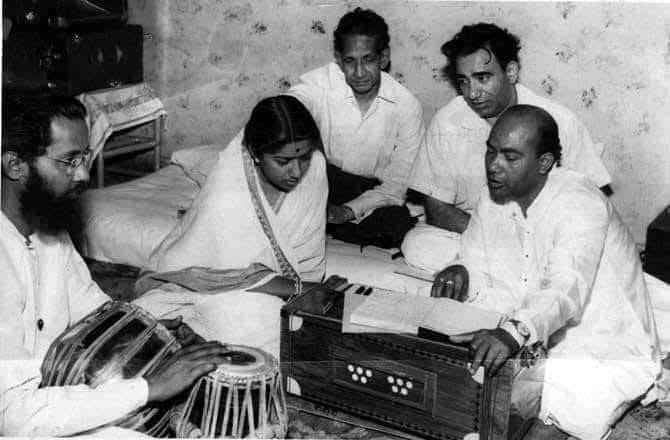

Ali Akbar Khan was born on 14th April 1922 in the village of Shibpur, Brahmanbaria, in present-day Bangladesh, to renowned musician and teacher, Allauddin Khan and Madina Begum. Soon after his birth, Khan's family returned to Maihar (in present-day Madhya Pradesh, India) where his father was the primary court musician for the Maharaja Brijnath Singh of the princely state.
From an early age Khan received training from his father in various instruments as well as vocal composition, but finally gravitated towards the Sarod. Allauddin was a perfectionist and a strict taskmaster, and Khan's lessons started before dawn and often lasted 18 hours a day. After years of rigorous training, Ali Akbar Khan gave his debut performance at a music conference in Allahabad in 1936, at the age of 13. In 1938, Khan gave his first recital on All India Radio, Bombay.
In 1943, on the recommendation of Ustad Allauddin Khan, Ali Akbar Khan was appointed a court musician for the Maharaja of Jodhpur, Umaid Singh. Over there, he taught and composed music besides giving recitals and was accorded the title of Ustad by the Maharaja. Hanwant Singh succeeded his father as Maharaja of Jodhpur on 9 June 1947 and held the title until his death, in a plane crash on 26 January 1952.
This was a big shock for Ustadji and he soon left Jodhpur for Mumbai along with his disciple Jaidev Verma. Both had an ambition to score music for Hindi films.
In Mumbai, Ustadji got his first opportunity as a music composer for Navketan banner's Aandhiyan (1952) directed by Chetan Anand. Lata Mangeshkar sang the multi-layered title song, "Hai kahin par shaadmani" written by Narendra Sharma. As a token of her respect to the sarod maestro, she did not charge any fee and distributed whatever she got to all musicians. In his autobiography, Ustadji mentioned that Lata was so busy those days that she learned this song on telephone but spared about two weeks for rehearsal.
This long song that appears in three parts in the film, is available on three sides of 78 rpm discs.
In the very next year 1953, Ustadji composed for another Navketan film Humsafar directed by A.N. Banerjee. This film had one sweet Lata-song ‘Koi door bajaye baansuri’, which was penned by Sahir Ludhiyanvi.
Another memorable Lata- Ali Akbar Khan association in Hindi film music happened in 1955-film Seema in Shankar-Jaikishan’s music. The legend goes that after being challenged by Ustadji that using Sarod in film-music was not an easy task, S-J came up a composition for the ages. Lata’s heartrending ‘Suno chhotisi Gudiya ki lambi kahani’ is literally composed as a jugalbandi with Ustadji’s intricate Sarod pieces.
Buoyed by their Seema- success, Shankar-Jaikishan later once again used Ustadji's sarod pieces brilliantly in 1956-film Patrani's raga Shivranjani-based Lata-gem 'Chandrama Madbhara Kyun Jhoome Baadar Mein.' Once again, Khan-saheb's Sarod added its magic to Lata's wondrous rendition.
Few months ago, while searching for Lata Mangeshkar's non-film Hindi songs, I found two compositions sung by Lata Didi on All India Radio in 1958. I got audio recordings of both the songs from various groups dedicated to music operating around the world.
While searching, I came across more information about these songs in the SARANG bulletin published by All India Radio. Sarang Year 23, Issue 15, dated July 22, 1958, listed one of the songs ‘Sakhi me jabse hui virani’ with Lyrics: Vidyavati 'Kokil'; Singer: Lata Mangeshkar and Composer: Ali Akbar Khan. Complete poem and notations of the song were also published in the issue.
Sarang, Year 23, Issue 8, dated April 7, 1958 listed the other song as ‘Bandh diye kyon pran pranonse' with Lyrics: Shri Sumitranandan Pant and Singer: Lata Mangeshkar. While the issue has the complete poem and notations, there is no mention of music composer.
Listening to the rich Sarod instrument accompaniment in both songs, it appeared that this second song was also composed by Ustad Ali Akbar Khan.
There is no mention in the biographies of Lata Mangeshkar and Ustad Ali Akbar Khan about these two non-film songs. I could not get any information on whether the 78 RPM was ever released. Recently I could contact Lajo Gupta, daughter of Ustad Ali Akbar Khan. She confirmed that ' Bandh Diye Kyun Pran Pranonse ' was also composed by her father. Ustadji had used similar tune in same year for a Bengali film Nupur, for a song- Dhanya haba Je marane rendered by Sandhya Mukhopadhyay.
Thanks to all the known and unknown music lovers who have preserved these recordings for all these years, we are able to enjoy these rare songs.
As the world celebrated the late Ustad Ali Akbar Khan’s birth centenary last year and bemoaned Lataji's sad demise early this year, here is my small tribute to these geniuses, recalling their brief but memorable musical collaboration.
Author info is not available!